- Home
- James David Victor
Invasion- Proxima Page 9
Invasion- Proxima Read online
Page 9
14
Utopian Dreams
Fanfare and dazzling sunlight greeted them as Solomon led the way down the craft’s ramp, his heavy metal power armor suit feeling as light as a feather thanks to the internal servo-assists. Solomon had a moment to wonder at just how comfortable this upgrade was—far better than the light tacticals they had worn for so long—before he turned to take his place standing at the edge of the ramp.
Jezzy and Karamov joined him at his side, while Menier, Ratko, and Willoughby performed a mirroring position in front of them, creating an avenue for the ambassador and her assistant to walk though.
The ways of ambassadorial visits couldn’t have changed much since the times of sailboats and people in funny cloaks, Solomon thought, as the air was split by trumpets and the ambassador sedately made her way down the ship’s ramp. It gave Solomon plenty of time to look around him…and marvel.
The imprimatur’s ‘personal landing site’ looked like a small park, with three large bare patches and adjoining bare paths that joined together, leading to a white palatial building.
In the distance, Solomon could see a brick wall surrounding the landing site, encrusted with ivy and with the heads of curiously Earth-like trees peeking from the far side. The white-walled palace imitated a neo-classical style, Solomon saw, with colonnade terraces and formal gardens. The overall building was quite low—no more than three stories high at the highest levels.
But what was really astonishing was the view that the palace had over the city of Proxa, the capital city of the planet and the largest. The imprimatur’s palace was placed on a ridge of rolling highland that descended into woods and patchwork meadows on one side, but on the sea-ward side displayed a huge bay with waters as blue as sapphire.
The city of Proxa itself was designed on vaguely hexagonal lines—different squares and districts all built according to hexagonal patterns, with more brick walls between them or lines of trees. It could have been something out of a fairy tale, save for the tall chrome buildings of Proxa’s center. Earth’s sister world even had skyscrapers now, it appeared.
The city displayed a cluster of parks and even small lakes, and Solomon scanned the scene for the building that he knew had to be there. That he and his team had come to infiltrate…
There. The gold triangular spire sat in the middle of its own hexagonal precinct, with low, white, L-shaped buildings clustered around it. Despite its gold, terraced walls, the entire site was still a very green, airy space, with each terrace of NeuroTech’s headquarters overflowing with greenery, and the avenues between the low white buildings showing off lines of landscaped trees.
Proxa is a vision of heaven, Solomon had to admit. How could anyone think that there could be any crime, or poverty, or disease here?
Or that the building there is churning out murderous robots to fuel a distant civil war? Solomon’s jaw clenched.
“Ambassador, a pleasure…” he overheard the Imprimatur of Proxima say as she approached, flanked only by two people in silver and white robes. She was a small woman with curly chestnut-gold hair slowly giving over to silver. She wore only a simple silver star at her breast, and no other ostentation or insignia. No honor guard? Solomon wondered. That must mean that either Proxima really is an entirely peaceful colony, with no awareness of what NeuroTech is doing under their noses, or…
Or that she was so supremely confident of her strength that she wasn’t afraid.
He thought that the second explanation was the most likely.
“These are…troublesome times we find ourselves in,” Solomon overheard the two women talking as he walked a few steps behind and to the left of the ambassador. At his side walked Jezzy, and behind them walked the other Outcasts, though without Malady, whom Solomon had ordered to stay in the craft with the ambassador’s personal assistant.
When we need some big guns, I’ll need him, he thought. And it also didn’t hurt having one of his own men with their most obvious escape ship, either.
Maybe I can tell Malady to hold the ship in orbit or come and get us when we’re done instead of… Solomon’s mind was racing as he tried to figure out the plan of attack. It was difficult since he was also trying his best to listen in on the ambassador’s conversation and register their surroundings.
The imprimatur’s palace was every bit as grand at close range as it had appeared at a distance, Solomon realized. White stone walls and marble columns, flagstones veined with quartz, and everything set in beautiful parklands with many plant species brought or seeded from Earth, he saw. Their flagstone path did not head straight up to the palace above them, however, but took time to wind through the sedate garden, turning past banks of lavender and pruned rhododendron bushes.
“I am glad that Proxima understands the gravity of the situation,” the ambassador stated. “Obviously, the Confederacy wishes to extend its continued support to all of its colonial allies…”
The imprimatur stopped walking suddenly, making the rest of the line shuffle awkwardly to a halt to avoid stumbling into each other. “Even Mars?” she stated incredulously.
The ambassador, to her credit, didn’t skip a beat. “The Confederacy believes strongly in the people and the prosperity of Mars, and when they are free of the yoke of their fanatics, we will all be safer.”
“And by the fanatics, you mean the Chosen of Mars? Father Ultor’s group?” the imprimatur said evenly. “I believe I heard that both Father Ultor and Imprimatur Valance of Mars were in Confederate Marine Corps custody, am I right?
The ambassador really did hesitate then, nodding. “Yes, that is correct.”
“And the Confederate Marine Corps have dropped thermonuclear devices on Mars? Am I correct,” Imprimatur Rhossily said, “or is that just space gossip?”
“No, Imprimatur… That is correct. It was believed that a show of resounding force was necessary as a precaution to avoid further conflict. I am sure that you understand,” the ambassador said, with a hint of steel to her voice.
“I understand perfectly, Ambassador,” the Imprimatur of Proxima said, gesturing for them to walk on, taking a set of steps that led up to a white-walled terrace and a set of grand wooden doors into the palace.
And the line of waiting cyborgs.
Solomon heard Jezzy’s sudden intake of break as he was already stepping forward, one hand falling to his side where his Jackhammer was slung.
“Lieutenant!” It was the ambassador, putting a warning hand out and lightly touching Solomon’s arm.
The cyborgs weren’t attacking. They weren’t even raising their weapons or looking in their direction. Instead, Solomon saw that the four man-machine things, each with the same variety of body parts recast in chrome and steel, stood stock still in front of the doors, gazing out over Proxima.
“Ah, yes. I suppose they can look a little alarming to the untrained eye…” the imprimatur was saying with a small smile. “But really, Ambassador, there is no need for your man to worry.”
Your man? Solomon raised an eyebrow behind his helmet. I am a military commander, not a hired servant!
“Yes, most alarming, I have to admit,” the ambassador smoothed over the momentary tension. “I have never seen their like. Is it a new type of tactical suit that Proxima has developed?” she said lightly, and Solomon could hear the heavy layers of subtext there.
Solomon didn’t know if the ambassador knew all about the Message, and the Ru’at, but he thought that it was likely that she did. She would probably, in the very least, know that he and his squad had been sent here to neutralize NeuroTech precisely because it was churning out murderous machines like these.
But so far, the general populous didn’t know that cyborgs were being used on the battlefields, against the Confederate Marine Corps, he realized. Did the Imprimatur of Proxima know?
“No, not a tactical suit, although similar, I suppose…” The imprimatur led the way up the steps and past the silent, watchful cyborgs as the doors opened soundlessly in front of her. �
�Proxima wouldn’t dream of developing tactical suits when we already have the sworn protection of the good Marine Corps.” The imprimatur managed to nod at Cready in recognition, and he inclined his head back.
“What a load of lies,” he heard Jezzy whisper over their squad channel.
“Probably, but we don’t know yet,” Solomon murmured under his breath.
“Then why not staff your palace with Marines, like I have?” he heard the ambassador say lightly as they walked through a grand hallway with a high, arched ceiling and a checkerboard floor. Distant windows at the other end of the room let in the bright Proxima sunlight from an internal courtyard. Two wide staircases of stone led up and out to the right and left.
“Oh, well… Proxima is very proud of our resourcefulness,” the imprimatur said with an icy smile, leading them to a small wooden table and chairs, where carafes of wine and water, and a small selection of fruits and sweet pastries, sat.
“Please, take a seat, Ambassador, and I will get seats for your honor guard…”
“No need, ma’am,” Solomon murmured respectfully as he stood at the ambassador’s shoulder, with the rest forming a line behind him.
“As you wish.” The imprimatur nodded gracefully.
“You were saying, Rhossily, about Proxima’s resourcefulness?” Ambassador Ochrie looked up to ask. Solomon noted that she didn’t make a move to touch either the wine, water, or food. Wise woman, he thought.
“Oh yes. Well, I mean sustainability, of course. The cost in fuel, time, and effort it would require to bring a complement of Marine guards all the way out here to Proxima and then ship them back and have them replaced all the time seems ridiculous.” The woman smiled.
“Of course, you know that the Confederacy would reimburse Proxima for any bills associated…” the ambassador began.
“But still, it offends my sense of balance. When one of our very own Proximian companies here offered us these warriors, who are built from our own processed metals, with the bodies of our own Proximians, then it seemed a much more…” She drew an imaginary circle in the air between them. “…complete solution.”
“No place is an island, Imprimatur,” the ambassador countered. “Proxima’s self-reliance is admirable, but why make your challenges any more difficult than they already have to be?” Solomon realized that there was something much more important being discussed here, under the surface. Was the Confederate Ambassador warning the imprimatur to show her allegiance to the Confederacy? To not go it alone?
“The Confederacy is like a powerful, well-oiled machine.” The ambassador drew another imaginary circle, copying her opposite number. “And it can lend its strength to all of its members.” She then drew a much larger circle in the air around the first. “You can think of it like cogs in that machine, all working together to make life easier for all of humanity.”
“What a poetic and inspiring take on Confederate policy,” the imprimatur said a little stiffly. “But is it not better for each of those cogs in the machine, as you so eloquently describe it, if they can all at least pull their own weight? No cog wants to be dragged down by any others.”
That is what this place is all about, Solomon realized. That is why Proxima has always been called a sort of heaven… All of the pieces of evidence, from the missile satellites to the parklands and the perfect hex-gridded layout of Proxa, jumped out to Solomon’s mind. They believed in a certain complete wholeness and balance, of everything working in accordance with its parts, and of their planet as a whole being entirely self-sustaining.
Which makes sense for a colony world so far from the home world, Solomon thought. Proxima had to generate its own energy, feed its own people, and it was only sensible too that it could defend itself.
But Solomon also knew that what they were talking about was a sort of treason.
Proxima believes that it can go it alone, and the imprimatur has said as much, he considered. They wanted to be self-reliant, and that meant self-governing.
A free Proxima, independent of the Confederacy.
“Tell me, Ambassador, have you ever heard of a man called Malcom Jekkers?” the imprimatur said, pouring herself a glass of water and sipping it slowly as she stood in front of them.
Malcom Jekkers… Solomon shot a look at Jezzy beside him. They certainly had heard of Malcom Jekkers. In fact, Solomon remembered looking into the old man’s eyes as he had helped him to tunnel out of Titan’s collapsing ice-tunnels.
He had been a prisoner of the Confederacy, sentenced to a life of mining for promoting Proximian independence. And he had been shot by—apparently—Martian dissidents. Although those same Martian dissidents had apparently blown up the ice mine and fired on their own demagogue leader Father Ultor… Solomon knew that there was a mystery there. Someone had started this war, and he was ready to bet that it was NeuroTech, sparking the conflict and then selling its murderous weaponry wherever it could.
“Yes, of course I do,” the ambassador said, sounding a little shaky and finally discombobulated by Imprimatur Rhossily’s even-minded charm. “I was there, at Titan, when…”
“When the Confederacy seized Father Ultor and Imprimatur Valance of Mars,” Rhossily stated heavily.
“Martian separatists were behind the attack,” the ambassador countered.
A few choice moments of silence from Imprimatur Rhossily spoke volumes that words never could, before she cleared her throat and set her glass of water down once again. “Anyway. On that day, a man named Malcom Jekkers, a Confederate prisoner, was killed. As you know, he was imprisoned by the Confederacy for supposedly seditious literature…” Solomon saw Rhossily’s jawline harden a little as her carefully manicured composure cracked just a fraction. “Whatever books that Jekkers might have liked to read, he was in fact an architect. An actual architect. He was the one who helped design the Proxima we see today.”
“I don’t see what this has to do with whether Proxima wants Confederate protection or not,” the ambassador cut to the chase.
A frown from her opposite number. “Jekkers believed in whole systems. His thinking was a thing of beauty and peace. Every system—be it a city or a family household or an entire colony world—has to be able to meet its needs internally to be able to be strong enough to meet others externally, if you see what I mean. It’s a very Buddhist idea, actually.”
The ambassador didn’t answer.
“It is a great loss to all of humanity that Malcom Jekkers died on the frozen surface of Titan,” Rhossily said at last, standing up a bit straighter. “I will have my people show you to your rooms, as well as your guards, where you can be rested. We will meet again this evening over a formal state dinner. I have already invited a host of local thinkers and business leaders from Proxa, who are all dying to meet the Ambassador of Earth.”
The ambassador stood formally, offering a graceful nod to her counterpart as Solomon suddenly had a thought.
“Names,” he said out loud.
“Lieutenant?” Ambassador Ochrie said through the corner of her mouth.
“I will need a list of names of all those expected to attend, for security purposes against possible threats to the ambassador’s life, you understand…” he intoned heavily towards Imprimatur Rhossily. He saw a flash of hatred cross her eyes then, and in that moment, he knew that she had no intention of pledging allegiance to the Confederacy.
“Of course, Lieutenant. Anything for the safety of the ambassador,” Rhossily said, before turning on her white heels and clipping out of the room.
Ochrie waited for the woman to fully disappear into the side rooms before she turned and raised an eyebrow at Solomon. “You and I will need to talk, young man.”
“She has no intention of siding with the Confederacy,” Solomon argued with Ochrie in the ambassador’s large, two-room apartment in the imprimatur’s palace. Although he and the rest of the Outcasts should be next door in their much more basic but still very comfortable suite of rooms, he had followed the ambassador in her
e along with Lance Corporal Ratko to set up the interference devices.
The room itself was what Solomon might have described in his former life as a golden egg. There were oil paintings on the wood-paneled walls that Solomon thought must be worth millions, and every piece of furniture from the table to the chairs to the small desk under the bay windows had to be antique. The windows led out onto a tiny balcony that overlooked the internal courtyard, but both Solomon and Ambassador Ochrie stood in the center of the room, away from prying eyes.
The only other additions to the golden egg were the tall, thin black metal tripods scattered around the edges of the room, looking like mounts of a camera shoot. These were the interference devices that Ratko carried, turning them on to create a zone of statically-charged particles that would interfere with any listening, viewing, or scanning devices, before Lance Corporal Ratko had returned to their shared room, leaving Solomon and Ochrie to talk.
“Not yet. But when she sees that her dreams of Proximian independence are futile…” Ochrie argued.
“You heard her. It’s too deeply ingrained. This Malcom Jekkers helped to create the dream, and Rhossily reveres him almost like a saint!” Solomon pointed out. “But you’re right in one way, Ambassador…”
“Oh please, do lecture me on statecraft, Lieutenant Cready…” Ochrie said caustically, pacing the room.
“That Rhossily is a dreamer. She’s a utopian,” Solomon said. “She’s not like the Chosen of Mars, who have an axe to grind with the Confederacy. She’s protecting NeuroTech because she thinks they are going to help her Proximian dreams come to fruition. But they won’t.”

 Ranger Bayne
Ranger Bayne Valyien Boxed Set 3
Valyien Boxed Set 3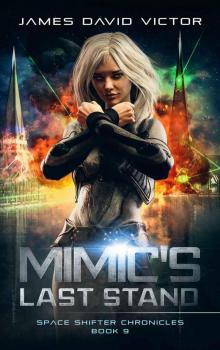 Mimic's Last Stand
Mimic's Last Stand A. I. Uprising (Valyien Book 4)
A. I. Uprising (Valyien Book 4) The Kepler Rescue
The Kepler Rescue Last Stand Boxed Set
Last Stand Boxed Set Challenge of Steel
Challenge of Steel Mimic Saves Her People
Mimic Saves Her People Enemy Within (Jack Forge, Lost Marine Book 7)
Enemy Within (Jack Forge, Lost Marine Book 7)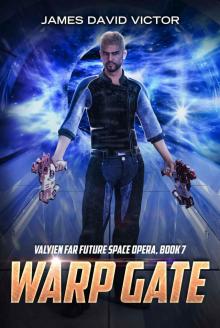 Warp Gate (Valyien Far Future Space Opera Book 7)
Warp Gate (Valyien Far Future Space Opera Book 7) A. I. Apocalypse (Valyien Far Future Space Opera Book 8)
A. I. Apocalypse (Valyien Far Future Space Opera Book 8) Captain Bayne Boxed Set
Captain Bayne Boxed Set Blue Star Marine Boxed Set
Blue Star Marine Boxed Set Night Raiders
Night Raiders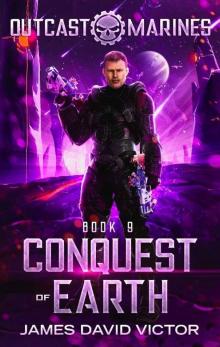 Conquest of Earth
Conquest of Earth Betrayal (Jack Forge, Lost Marine Book 6)
Betrayal (Jack Forge, Lost Marine Book 6) Sharpe End
Sharpe End Parallax
Parallax Invasion- Proxima
Invasion- Proxima The Torgoran Revolt (Plundering the Stars Book 3)
The Torgoran Revolt (Plundering the Stars Book 3) Outcast Marines series Boxed Set 2
Outcast Marines series Boxed Set 2 Outcast Marines series Boxed Set
Outcast Marines series Boxed Set Captain Bayne
Captain Bayne Outcasts of Earth (Outcast Marines Book 1)
Outcasts of Earth (Outcast Marines Book 1) Lost Marine
Lost Marine Eternal Enemy
Eternal Enemy Command Code
Command Code Ranger Bayne (The Deep Black Book 3)
Ranger Bayne (The Deep Black Book 3) Mimic: The Space Shifter Chronicles Boxed Set (Books 1 - 9)
Mimic: The Space Shifter Chronicles Boxed Set (Books 1 - 9) The Deep Black Space Opera Boxed Set
The Deep Black Space Opera Boxed Set Federation at War (Blue Star Marines Book 1)
Federation at War (Blue Star Marines Book 1) AI Uprising
AI Uprising The Xarren Escape (Plundering the Stars Book 2)
The Xarren Escape (Plundering the Stars Book 2) Valyien Boxed Set 1
Valyien Boxed Set 1 New Enemy (Jack Forge, Lost Marine Book 4)
New Enemy (Jack Forge, Lost Marine Book 4) Alien Legacy
Alien Legacy A I Apocalypse
A I Apocalypse Invasion (Blue Star Marines Book 3)
Invasion (Blue Star Marines Book 3) Alliance (Jack Forge, Lost Marine Book 5)
Alliance (Jack Forge, Lost Marine Book 5) Double Sharpe (Raven Sharpe Chronicles Book 2)
Double Sharpe (Raven Sharpe Chronicles Book 2) Metal Warrior: Steel Cage (Mech Fighter Book 6)
Metal Warrior: Steel Cage (Mech Fighter Book 6) Parallax (The Deep Black Book 1)
Parallax (The Deep Black Book 1) Metal Warrior: Steel Curtain (Mech Fighter Book 8)
Metal Warrior: Steel Curtain (Mech Fighter Book 8) Mech Warrior: Born of Steel (Mechanized Infantry Division Book 1)
Mech Warrior: Born of Steel (Mechanized Infantry Division Book 1) Outcast Marines Boxed Set
Outcast Marines Boxed Set Metal Warrior: Ring of Steel (Mech Fighter Book 7)
Metal Warrior: Ring of Steel (Mech Fighter Book 7) The Elarri Heist (Plundering the Stars Book 1)
The Elarri Heist (Plundering the Stars Book 1) Forged Under Siege (Jack Forge, Fleet Marine Book 6)
Forged Under Siege (Jack Forge, Fleet Marine Book 6) Forging a Trap (Jack Forge, Fleet Marine Book 8)
Forging a Trap (Jack Forge, Fleet Marine Book 8) Daikon (ESS Space Marines Book 2)
Daikon (ESS Space Marines Book 2) Mimic Changes the World
Mimic Changes the World Double Sharpe
Double Sharpe Invasion- Pluto
Invasion- Pluto Mimic and the Fight for Freedom (Space Shifter Chronicles Book 3)
Mimic and the Fight for Freedom (Space Shifter Chronicles Book 3) Forged in Battle (Jack Forge, Fleet Marine Book 5)
Forged in Battle (Jack Forge, Fleet Marine Book 5) Lykos (ESS Space Marines Book 6)
Lykos (ESS Space Marines Book 6) Metal Warrior: Precious Metal (Mech Fighter Book 5)
Metal Warrior: Precious Metal (Mech Fighter Book 5) Forged to Hunt
Forged to Hunt Earth Space Service Space Marines Boxed Set
Earth Space Service Space Marines Boxed Set Alpha Rises
Alpha Rises Power of the Seers (Dragon Oracle Book 4)
Power of the Seers (Dragon Oracle Book 4) Forged to Lead (Jack Forge, Fleet Marine Book 3)
Forged to Lead (Jack Forge, Fleet Marine Book 3) Nebula (ESS Space Marines Book 4)
Nebula (ESS Space Marines Book 4) Forged in Darkness
Forged in Darkness Forged in Space
Forged in Space Metal Warrior: Steel Trap (Mech Fighter Book 3)
Metal Warrior: Steel Trap (Mech Fighter Book 3) Mimic and the Space Engineer Boxed Set, Books 1 - 3
Mimic and the Space Engineer Boxed Set, Books 1 - 3 World Breaker Boxed Set (ESS Space Marines Omnibus Book 3)
World Breaker Boxed Set (ESS Space Marines Omnibus Book 3) Forged to Lead
Forged to Lead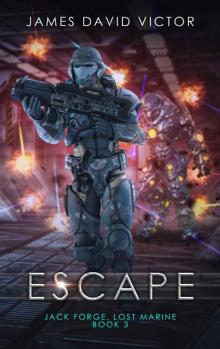 Escape (Jack Forge, Lost Marine Book 3)
Escape (Jack Forge, Lost Marine Book 3) Forged Under Siege
Forged Under Siege Jack Forge, Fleet Marine Boxed Set (Books 1 - 9)
Jack Forge, Fleet Marine Boxed Set (Books 1 - 9) Forged in Darkness (Jack Forge, Fleet Marine Book 4)
Forged in Darkness (Jack Forge, Fleet Marine Book 4) Insurrection
Insurrection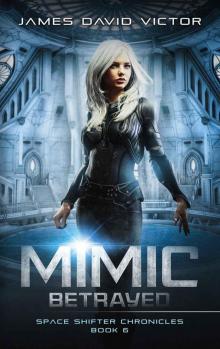 Mimic Betrayed (Space Shifter Chronicles Book 6)
Mimic Betrayed (Space Shifter Chronicles Book 6) Mimic Goes to War (Space Shifter Chronicles Book 5)
Mimic Goes to War (Space Shifter Chronicles Book 5)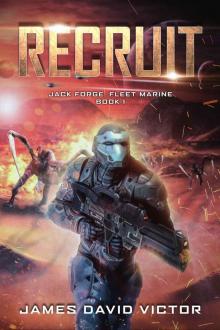 Recruit (Jack Forge, Fleet Marine Book 1)
Recruit (Jack Forge, Fleet Marine Book 1)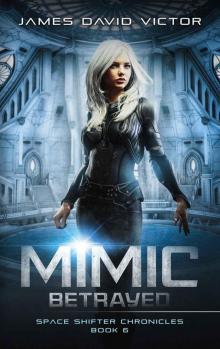 Mimic Betrayed
Mimic Betrayed Power of the Seers
Power of the Seers Mimic and the Journey Home (Space Shifter Chronicles Book 2)
Mimic and the Journey Home (Space Shifter Chronicles Book 2) Mimic and the Space Engineer (Space Shifter Chronicles Book 1)
Mimic and the Space Engineer (Space Shifter Chronicles Book 1)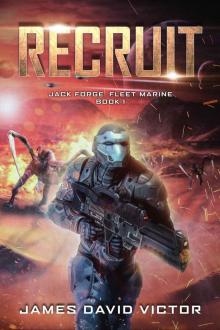 Recruit
Recruit Forged to Hunt (Jack Forge, Fleet Marine Book 7)
Forged to Hunt (Jack Forge, Fleet Marine Book 7) Forged by War (Jack Forge, Fleet Marine Book 9)
Forged by War (Jack Forge, Fleet Marine Book 9) Pursuit (Silver Cane Book 1)
Pursuit (Silver Cane Book 1) Zenith (ESS Space Marines Book 1)
Zenith (ESS Space Marines Book 1) Star Chaser (ESS Space Marines Book 3)
Star Chaser (ESS Space Marines Book 3) Forged in Space (Jack Forge, Fleet Marine Book 2)
Forged in Space (Jack Forge, Fleet Marine Book 2) Defense (Silver Cane Book 2)
Defense (Silver Cane Book 2) Infiltrate (Silver Cane Chronicles Book 3)
Infiltrate (Silver Cane Chronicles Book 3) Alpha Rises (Valyien Book 2)
Alpha Rises (Valyien Book 2) Mimic Raises an Army
Mimic Raises an Army Alien Evolution (Valyien Book 3)
Alien Evolution (Valyien Book 3) Arkana (ESS Space Marines Book 4)
Arkana (ESS Space Marines Book 4) Lykos
Lykos Forging a Trap
Forging a Trap Mimic Goes to War
Mimic Goes to War Earth Space Service Boxed Set: Books 1 - 3 (ESS Space Marines Omnibus)
Earth Space Service Boxed Set: Books 1 - 3 (ESS Space Marines Omnibus) Stranded (ESS Space Marines Book 7)
Stranded (ESS Space Marines Book 7) Mimic Raises an Army (Space Shifter Chronicles Book 4)
Mimic Raises an Army (Space Shifter Chronicles Book 4) Alien Evolution
Alien Evolution